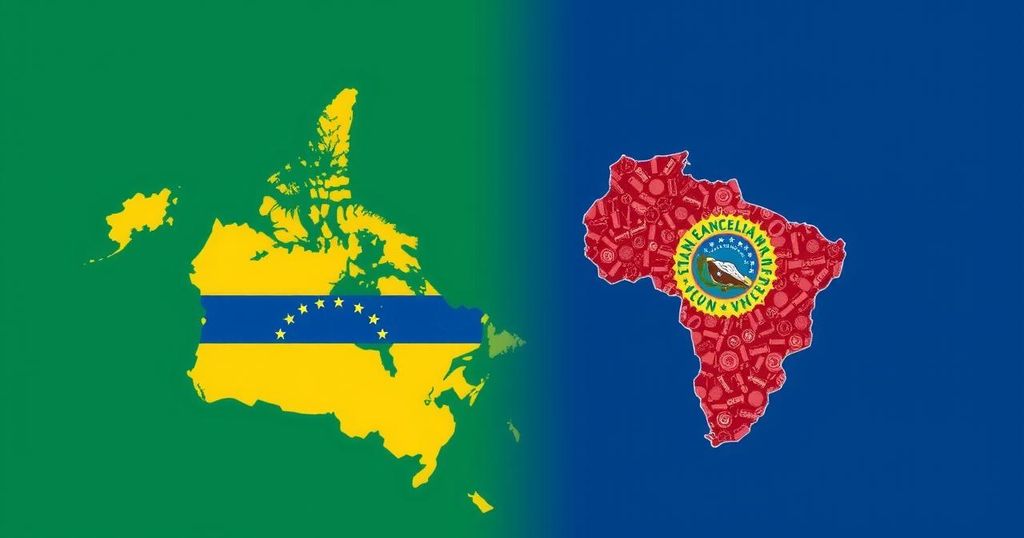Economic Lessons for South America from Bolivia and Venezuela’s Crises

The economic crises in Bolivia and Venezuela reveal the vulnerabilities of resource-dependent economies, marked by declining production, political instability, and corruption. Bolivia struggles with a downfall in natural gas exports due to mismanagement, while Venezuela faces the consequences of over-reliance on oil and authoritarian governance. Both cases highlight the critical need for economic diversification and reform across South America to ensure stability and resilience.
South America, rich in natural resources, is currently confronting significant economic crises that underscore the fragility of its political and economic structures. The cases of Bolivia and Venezuela serve as critical examples of the vulnerabilities associated with economies reliant on resource exports. Both nations, despite having unique circumstances, share common issues rooted in economic mismanagement, dependence on natural resources, and political instability.
In Bolivia, the decline of natural gas production has resulted in a dramatic downturn in its economy. Once considered a success story, the country has seen its natural gas exports plunge by approximately 40% from their previous peak due to underinvestment in extraction and exploration. This decline has adversely affected the trade balance and diminished foreign reserves. President Luis Arce is currently navigating a challenging political landscape, facing opposition and internal challenges from factions loyal to former President Evo Morales, which has stalled vital economic reforms. The situation has been further complicated by social unrest stemming from rising inflation and scarcity of essential goods, diminishing public trust in governance.
Conversely, Venezuela presents an alarming case of economic demise driven by its over-dependence on oil. Despite possessing the world’s largest oil reserves, persistent issues of corruption and mismanagement along with international sanctions have decimated the country’s economy. The fall in global oil prices beginning in 2014 intensified Venezuela’s crisis, which reached catastrophic heights with hyperinflation peaking at 1,700,000 percent in 2018. Amidst widespread shortages of basic goods, approximately 7 million Venezuelans have fled, contributing to a profound migration crisis. President Nicolás Maduro’s authoritarian policies have suppressed dissent but failed to address fundamental economic dilemmas, trapping the nation in a cycle of stagnation and repression.
The crises in these two nations reveal the perilous nature of resource dependency. Heavy reliance on hydrocarbons undermined economic resilience; when international prices declined, so did national revenues. Particularly, both governments neglected economic diversification, resulting in vulnerability to external shocks. Political tumult has further aggravated economic woes; in Bolivia, the conflict between Arce and Morales has led to governance paralysis, while in Venezuela, Maduro’s autocratic authority has estranged international allies and deepened economic isolation. Additionally, widespread corruption and mismanagement have eroded public confidence in governmental institutions, deepening the crises.
Despite their shared challenges, the governments of Bolivia and Venezuela have responded differently to their respective crises. Under President Arce, Bolivia has made efforts to stabilize the economy by courting foreign investment and seeking to diversify exports. Unfortunately, these initiatives are hindered by ongoing political strife and a lack of adequate infrastructure to support emerging industries. Meanwhile, Maduro has predominantly resorted to authoritarian practices, suppressing dissent and exerting control over scarce resources. His administration has sought to circumvent sanctions through alliances with countries such as China, Iran, and Russia. While this strategy has provided some immediate relief, it fails to address the underlying structural economic issues.
The ongoing crises in Bolivia and Venezuela convey essential lessons for South America. These two nations exemplify the risks associated with high dependence on natural resources and underscore the consequences of political mismanagement. Moving forward, it is imperative for South American nations to focus on comprehensive political and economic reforms aimed at fostering resilient and inclusive economies. The decisions made now will shape the region’s future, determining whether it emerges more robust or remains mired in cycles of instability and fragility.
Bolivia and Venezuela exemplify the broader challenges faced by South American nations heavily reliant on natural resources. Their economic crises stem from a combination of political mismanagement and a lack of diversification, highlighting the risks associated with dependence on commodity exports. Understanding these cases allows for a critical examination of the need for reforms that can fortify economic resilience and governance across the continent.
In summary, the economic crises in Bolivia and Venezuela illustrate the significant risks inherent in relying on resource-dependent economies. Both countries have faced dire consequences due to political instability, mismanagement, and a lack of diversification. As the region contemplates its economic future, the need for strategic reforms that promote stability and resilience has never been clearer. South America must heed these lessons to avoid repeating the mistakes that have led to turmoil in Bolivia and Venezuela.
Original Source: www.firstpost.com








